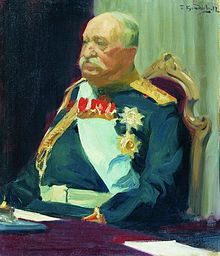Nikolay Pavlovich Ignatyev
| Nikolay Pavlovich Ignatyev | |
|---|---|

N. P. Ignatyev, by Boris Kustodiev (State Tretyakov Gallery, Moscow)
|
|
| Born | 29 January 1832 St Petersburg |
| Died | 3 July 1908 (aged 76) |
| Occupation | diplomat,statesman, politician, legislator |
Count Nikolay Pavlovich Ignatyev (historical spelling Nicolai Ignatieff; Russian: Никола́й Па́влович Игна́тьев; 17 January Old Style (29 January on Western calendar) 1832 – 20 June Old Style (3 July on Western calendar) 1908) was a Russian statesman and diplomat.
Nikolay Ignatyev was born in St Petersburg, to Maria Ivanovna Maltsova and Captain Pavel Nikolayevich Ignatyev. His father had been taken into favour by Tsar Nicholas I, owing to his fidelity on the occasion of the Decembrist revolt in 1825, and Grand Duke Alexander (later Tsar Alexander II) stood sponsor at the boy's baptism. After graduating from the Corps of Pages, at the age of seventeen he became an officer of the Russian Guards, serving with His Majesty's Hussar Guards Regiment. Ignatyev was then appointed to the General Staff and become adjutant to the general commanding in the Estonian military district. He was promoted to major in 1856. During Ignatyev's subsequent career he was at odds with Count Pyotr Shuvalov: another Corps of Pages alumnus.
Ignatyev's diplomatic career began at the Congress of Paris in 1856, after the Crimean War, where he participated in the negotiations regarding the demarcation of the Russo-Ottoman frontier on the lower Danube. He was then appointed as military attaché at the Russian Embassy in London. This assignment was a short one. According to the memoirs "Fifty Years of Service" written by his nephew Alexei Alexeyevich Count Ignatiev, Nikolay Ignatyev inadvertently pocketed a newly developed cartridge while inspecting the ordnance works of the British Army. In order to avoid diplomatic embarrassment he returned to Russia.
...
Wikipedia
